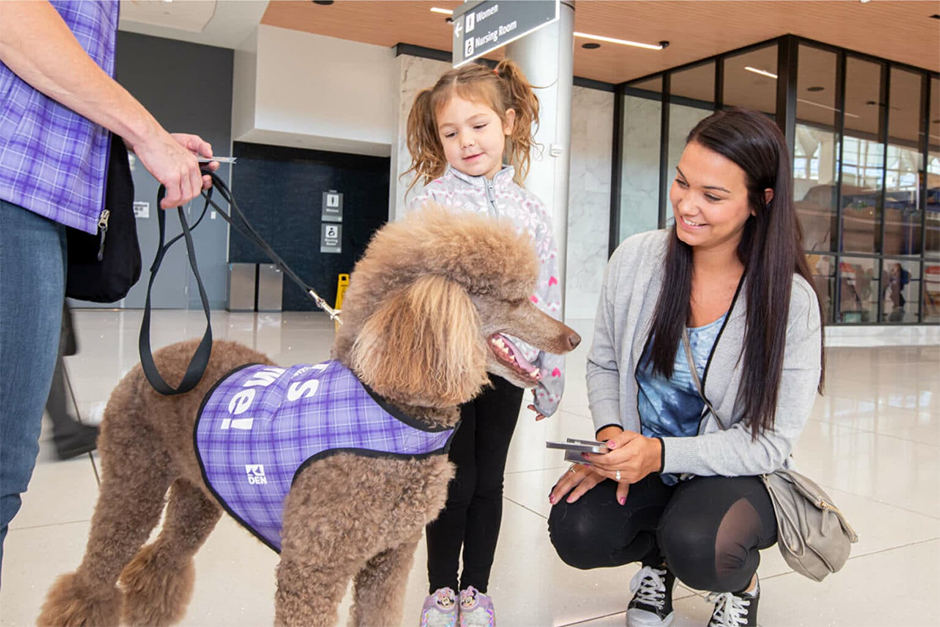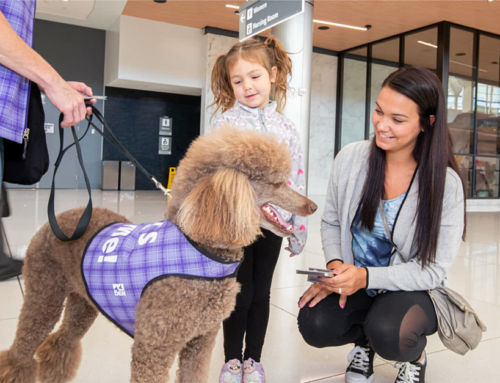
An Emotional Support Animal (ESA) is a type of companion animal that provides comfort to individuals with mental health conditions or emotional disorders. Unlike service animals, ESAs are not required to undergo specialized training to perform tasks related to a disability. Instead, their presence alone is meant to alleviate emotional distress.
Emotional Support Animal Access:
- Housing, including no-pet housing (under the Fair Housing Act)
- Airplanes (though restrictions have increased; varies by airline)
- College dormitories and student housing (depending on the institution’s policies)
Note: Unlike service dogs, emotional support animals generally do not have the same access rights to public places like restaurants, stores, or workplaces.
Key Points About Emotional Support Animals:
- Legal Protections:
- Fair Housing Act (FHA): Under the FHA, individuals with a valid ESA letter from a licensed mental health professional are entitled to live with their emotional support animal in housing units that typically have a “no pets” policy. Landlords are required to make reasonable accommodations for ESAs, and they cannot charge pet fees for them .
- Air Carrier Access Act (ACAA): Previously, ESAs were allowed to fly in the cabin with their owners free of charge, but as of 2021, airlines are no longer required to accommodate ESAs in this way. Some airlines may still allow ESAs in the cabin, but they are now treated like pets under airline policies, which means fees may apply and they might need to travel in the cargo hold .
- ADA: Unlike service animals, ESAs are not covered under the ADA, meaning they do not have the same access rights to public spaces. Businesses and other public entities are not required to allow ESAs unless otherwise specified by local or state laws .
- Requirements:
- To qualify for an ESA, an individual must receive a letter from a licensed mental health professional stating that they have a mental health condition that benefits from the support provided by the animal. This letter must be renewed periodically, typically annually.
- There is no requirement for specific training for ESAs, as their primary role is to provide emotional comfort rather than perform specific tasks .
- Controversies and Challenges:
- There has been some controversy around ESAs, particularly due to the ease of obtaining a certification letter online, which has led to instances of misuse. This has prompted stricter regulations from housing providers and airlines to ensure that only legitimate ESAs are accommodated.
- Some states have implemented stricter laws regarding the use of ESAs, particularly concerning fraudulent claims, which can lead to fines or other penalties .
Additional Resources:
- ADA.gov: For distinctions between service animals and ESAs under the ADA.
- Fair Housing Act Information: Details on ESA rights in housing situations.
- US Department of Transportation: Updates on air travel policies for ESAs.

An Emotional Support Animal (ESA) is a type of companion animal that provides comfort to individuals with mental health conditions or emotional disorders. Unlike service animals, ESAs are not required to undergo specialized training to perform tasks related to a disability. Instead, their presence alone is meant to alleviate emotional distress.
Emotional Support Animal Access:
- Housing, including no-pet housing (under the Fair Housing Act)
- Airplanes (though restrictions have increased; varies by airline)
- College dormitories and student housing (depending on the institution’s policies)
Note: Unlike service dogs, emotional support animals generally do not have the same access rights to public places like restaurants, stores, or workplaces.
Key Points About Emotional Support Animals:
- Legal Protections:
- Fair Housing Act (FHA): Under the FHA, individuals with a valid ESA letter from a licensed mental health professional are entitled to live with their emotional support animal in housing units that typically have a “no pets” policy. Landlords are required to make reasonable accommodations for ESAs, and they cannot charge pet fees for them .
- Air Carrier Access Act (ACAA): Previously, ESAs were allowed to fly in the cabin with their owners free of charge, but as of 2021, airlines are no longer required to accommodate ESAs in this way. Some airlines may still allow ESAs in the cabin, but they are now treated like pets under airline policies, which means fees may apply and they might need to travel in the cargo hold .
- ADA: Unlike service animals, ESAs are not covered under the ADA, meaning they do not have the same access rights to public spaces. Businesses and other public entities are not required to allow ESAs unless otherwise specified by local or state laws .
- Requirements:
- To qualify for an ESA, an individual must receive a letter from a licensed mental health professional stating that they have a mental health condition that benefits from the support provided by the animal. This letter must be renewed periodically, typically annually.
- There is no requirement for specific training for ESAs, as their primary role is to provide emotional comfort rather than perform specific tasks .
- Controversies and Challenges:
- There has been some controversy around ESAs, particularly due to the ease of obtaining a certification letter online, which has led to instances of misuse. This has prompted stricter regulations from housing providers and airlines to ensure that only legitimate ESAs are accommodated.
- Some states have implemented stricter laws regarding the use of ESAs, particularly concerning fraudulent claims, which can lead to fines or other penalties .
Additional Resources:
- ADA.gov: For distinctions between service animals and ESAs under the ADA.
- Fair Housing Act Information: Details on ESA rights in housing situations.
- US Department of Transportation: Updates on air travel policies for ESAs.






